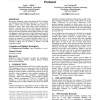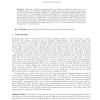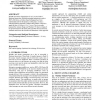310 search results - page 14 / 62 » An Efficient Protocol for Fair Secure Two-Party Computation |
PODC
2010
ACM
15 years 1 months ago
2010
ACM
Most protocols for distributed, fault-tolerant computation, or multi-party computation (MPC), provide security guarantees in an all-or-nothing fashion: If the number of corrupted p...
NOSSDAV
2009
Springer
15 years 4 months ago
2009
Springer
Peer-to-peer distributed virtual environments (DVE's) distribute state tracking and state transitions. Many DVE's - such as online games - require ways to fairly determi...
EUROCRYPT
2004
Springer
15 years 3 months ago
2004
Springer
Informally, a public-key steganography protocol allows two parties, who have never met or exchanged a secret, to send hidden messages over a public channel so that an adversary can...
XMLSEC
2003
ACM
15 years 2 months ago
2003
ACM
Reliable and atomic transactions are a key to successful eBusiness interactions. Reliable messaging subsystems, such as IBM’s MQ Series, or broker-based techniques have been tra...
NDSS
2000
IEEE
15 years 2 months ago
2000
IEEE
We analyze an optimistic contract signing protocol of Asokan, Shoup, and Waidner as a case study in the applicability of formal methods to verification of fair exchange protocols...



